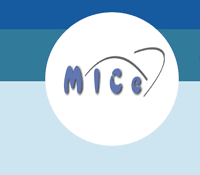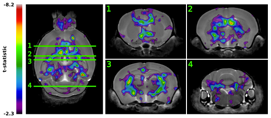 |
||||||||
 |
||||||||
|
|
||||||||
 |
 |
|||||||
THE TORONTO CENTRE FOR PHENOGENOMICS
MOUSE IMAGING CENTRE |
 |
|
|
Neuroanatomical Late Effects in Pediatric Brain Irradiation
Recent decades have seen a substantial improvement in the survival of children with brain cancer, the second most common cancer in children. Patients are now living into their adult years. Unfortunately, progressive side effects from brain tumour treatment are very common and represent the most significant long-term complication in childhood cancer survivors. Studies indicate that patients suffer a progressive decline in mental capacity and achieve a lower socioeconomic status, including lower overall levels of education, household income, and full-time employment. These debilitating mental side effects show a strong link with radiation therapy, which, on the other hand, improves survival. The mechanisms underlying altered development in radiation-treated patients are not clear. In our work, we are investigating changes in neuroanatomical development following irradiation. We have shown that much of the brain is developmentally impaired after irradiation. We are now investigating the cellular mechanisms underlying these changes using mouse mutants with altered radiation sensitivity. These results will, in the first case, provide a better understanding of factors to consider in design of new treatments that minimize damage to the brain. In the second case, we will identify, in each region of the brain, the cells most important for normal development after radiation treatment, allowing strategic selection of therapies to preserve critical cells and stop mental decline after radiation treatment. These results in combination will direct changes to brain tumour treatment in children so that future cancer survivors can expect the same quality of life as their peers. Research is funded by the Canadian Institutes of Health Research
|
||
|
© 2004 The Centre for Phenogenomics |
|
 Back to Projects
Back to Projects